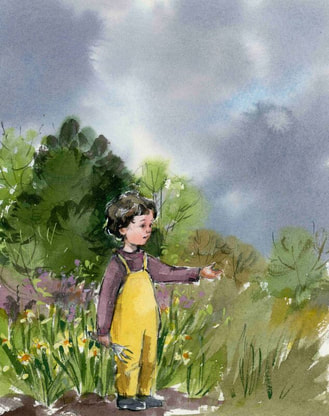Homecouver
By Hantian Zhang
April 15, 2023
April 15, 2023
Three shades of gray: the sky leaden, the water slate, and the city zephyr behind the drizzle, its dense windows smeared together. The drizzle, more like fog than rain, gnaws away the hard and freshens the verdant. A gaggle of geese peppers the shore like 2-shaped statues, still as if lost in melancholy.
--
This gray, stumbled upon during my visit to Vancouver, fuses so well with that of my hometown’s, Chongqing’s four-month-long winter of overcast and rain. Much is forgotten after two decades of absence, remembered only as an atmosphere, a mood. That mood of overlooking the gloomy river from a vantage, downtown’s skyscrapers amputated by low clouds; that of standing in the drizzle, wet gaining dimension and weight along the body’s outline; and that when the night foregrounds the pitter-patter, kneading the mind inward and fumbling through the folds of the heart.
--
A memory that has been long-lost: making my first drawing on a rainy night. A patch of green filled the paper, and a white house stood in the middle with a mushroom-shaped roof of bright red. It looked nothing like the houses around me, these cement walls, black tiles, or bamboo rafters.
Mom came to tuck me in, and I waved the piece to justify my staying late. “I saw it in a book of Xiaoting’s,” I said.
“It’s nice,” mom smiled.
“I want to live there when I grow up.” I had not yet lived elsewhere to speak against our cramped two-bedroom apartment, my parents and I taking up one bedroom, my grandparents occupying the other. Something about that foreign house, its structure, color, or shape, instantly established itself as better: more pleasant to look at, and must be more comfortable to live in.
--
Is it easier to look inward on rainy days? The clouds’ curvy lines, the tiny prickles of raindrops. You ensconce yourself in the pile of sofa pillows, the pitter-patter composing music in your heart. You put on some soft tones and brew a pot of Pu’er, and memories whir back with people and events sparkling at the tips of its ripple, wistful and bittersweet.
--
Another memory: Sunday evening, after the rain stopped, I climbed up the stands of my middle school’s sports field. At eye level, across the tracks and the dark grove, the city light was on full blast to mark the tail of the weekend, the neon’s tint diffusing across the low clouds.
I paused and stared at the lights, thinking not of the exams to come, the bully’s harsh words waiting ahead. I strained to see beyond the lights and through the clouds, the better life further west. High on the stands amidst the crisp air, I felt that life was closer to me than ever. I opened my arms toward it, pulling the air in and bending down, holding that life tight until it hurt.
--
I drive along Granville and past more houses resembling the one I drew: elegant frames, brick walls, lush topiaries. I imagine the lives unfolding behind the doors, work time and family time that is not qualitatively different from mine. Not even that different from my parents’ back home: cooking, cleaning, anchoring the attention on the day-to-day. I don’t feel a strong desire to live in this or that house; I feel a lightness and think I could be plugged in anywhere.
I drive on until I reach the cove. The sky’s gray velvet, the arbutus’ glossy trunks, the inlet’s frothy swash. A girl sits on the bench and meditates. I pass her until stepping on the last pebbles, the turbid water washing away the work tasks waiting ahead. I stare at the shades of gray as if to see through the clouds for the lives further east: the one I’ve actually lived, all the possible ones should I have stayed. That middle-school self is moving not by the better life he aspired to hold tight—not better in hindsight—but by his posture, standing and longing, the atmospheric solitude and the potential of youth.
--
Vancouver. Raincouver. Hongcouver. The city shapeshifts before different vantages, longed for then, longing for now.
--
This gray, stumbled upon during my visit to Vancouver, fuses so well with that of my hometown’s, Chongqing’s four-month-long winter of overcast and rain. Much is forgotten after two decades of absence, remembered only as an atmosphere, a mood. That mood of overlooking the gloomy river from a vantage, downtown’s skyscrapers amputated by low clouds; that of standing in the drizzle, wet gaining dimension and weight along the body’s outline; and that when the night foregrounds the pitter-patter, kneading the mind inward and fumbling through the folds of the heart.
--
A memory that has been long-lost: making my first drawing on a rainy night. A patch of green filled the paper, and a white house stood in the middle with a mushroom-shaped roof of bright red. It looked nothing like the houses around me, these cement walls, black tiles, or bamboo rafters.
Mom came to tuck me in, and I waved the piece to justify my staying late. “I saw it in a book of Xiaoting’s,” I said.
“It’s nice,” mom smiled.
“I want to live there when I grow up.” I had not yet lived elsewhere to speak against our cramped two-bedroom apartment, my parents and I taking up one bedroom, my grandparents occupying the other. Something about that foreign house, its structure, color, or shape, instantly established itself as better: more pleasant to look at, and must be more comfortable to live in.
--
Is it easier to look inward on rainy days? The clouds’ curvy lines, the tiny prickles of raindrops. You ensconce yourself in the pile of sofa pillows, the pitter-patter composing music in your heart. You put on some soft tones and brew a pot of Pu’er, and memories whir back with people and events sparkling at the tips of its ripple, wistful and bittersweet.
--
Another memory: Sunday evening, after the rain stopped, I climbed up the stands of my middle school’s sports field. At eye level, across the tracks and the dark grove, the city light was on full blast to mark the tail of the weekend, the neon’s tint diffusing across the low clouds.
I paused and stared at the lights, thinking not of the exams to come, the bully’s harsh words waiting ahead. I strained to see beyond the lights and through the clouds, the better life further west. High on the stands amidst the crisp air, I felt that life was closer to me than ever. I opened my arms toward it, pulling the air in and bending down, holding that life tight until it hurt.
--
I drive along Granville and past more houses resembling the one I drew: elegant frames, brick walls, lush topiaries. I imagine the lives unfolding behind the doors, work time and family time that is not qualitatively different from mine. Not even that different from my parents’ back home: cooking, cleaning, anchoring the attention on the day-to-day. I don’t feel a strong desire to live in this or that house; I feel a lightness and think I could be plugged in anywhere.
I drive on until I reach the cove. The sky’s gray velvet, the arbutus’ glossy trunks, the inlet’s frothy swash. A girl sits on the bench and meditates. I pass her until stepping on the last pebbles, the turbid water washing away the work tasks waiting ahead. I stare at the shades of gray as if to see through the clouds for the lives further east: the one I’ve actually lived, all the possible ones should I have stayed. That middle-school self is moving not by the better life he aspired to hold tight—not better in hindsight—but by his posture, standing and longing, the atmospheric solitude and the potential of youth.
--
Vancouver. Raincouver. Hongcouver. The city shapeshifts before different vantages, longed for then, longing for now.
Hantian Zhang is a writer based in San Francisco. His writing has appeared or is forthcoming in Diagram, The Offing, Eclectica, Manifest-Station, Waxwing, and elsewhere. He is a data scientist by day.

